Anger Issues: Causes, Symptoms, Types and Coping Strategies
Anger issues can affect all areas of life, from personal relationships to professional environments, and often lead to problems like aggression, poor decision-making, and strained communication.
According to the American Psychological Association, about 1 in 10 people in the U.S. struggles with some form of anger management problem, and 64% of Americans say they feel anger or frustration regularly.
This makes it an important topic to address, as it can have damaging consequences on both mental and physical health.
The key difference between healthy and unhealthy anger is how it’s managed. Occasional frustration is normal, but frequent outbursts, irritability, or difficulty calming down are signs of deeper anger.
If left untreated, anger can lead to chronic stress, anxiety, and even cardiovascular problems. Recognizing these signs early on prevents long-term harm and improves overall well-being.
This blog will explore anger issues, causes, and effective management strategies.
Whether you’re experiencing anger yourself or dealing with someone who has these challenges, understanding the causes and solutions can help you lead a calmer life.
What are Anger Issues?

Anger issues refer to the difficulty in managing and controlling feelings of anger, leading to frequent outbursts, irritability, and aggression.
While anger is a natural human emotion, it becomes a problem when it’s excessive, prolonged, or triggered by minor situations.
People with anger issues may find themselves reacting in ways that seem unrelated to the cause, often feeling overwhelmed by their emotions.
Anger issues can be reflected in various ways, such as yelling, becoming physically aggressive, or withdrawing from others.
These reactions affect the person experiencing anger and the people around them, leading to strained relationships and social isolation.
According to studies, nearly 8% of adults in the U.S. experience uncontrollable anger at some point, impacting their work, home, and personal lives.
Understanding the root cause of anger is the first step to resolving these issues. With the right strategies and support, anger issues can be controlled, leading to a healthier, happier life.
Examples of Anger Issues
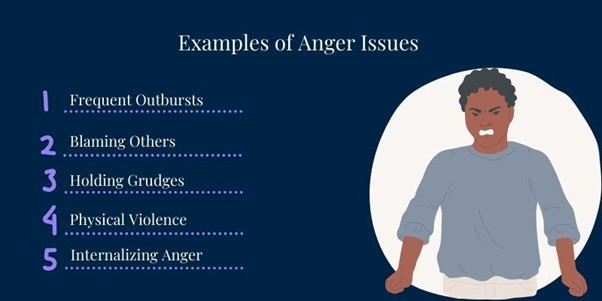
Anger issues can manifest in many ways, depending on the individual and the situation. Here are a few common examples that highlight the range of behaviors associated with uncontrolled anger:
- Frequent Outbursts: Someone with anger may have sudden, explosive reactions over small inconveniences, such as traffic delays or a disagreement at home. These outbursts can involve yelling, screaming, or even physical aggression.
- Blaming Others: People with anger problems may regularly blame others for their frustrations, even when unjustified. This often leads to relationship conflicts, where the person projects anger onto friends, family, or co-workers.
- Holding Grudges: Someone who has difficulty letting go of anger may hold onto resentment for long periods of time. This can lead to passive-aggressive behavior, where unresolved anger is expressed indirectly or subtly.
- Physical Violence: In severe cases, anger can lead to physical confrontations or property destruction. Breaking objects, slamming doors, or getting into fights are signs of unmanaged anger in a man.
- Internalizing Anger: Not all anger issues are outwardly expressed. Some people bottle up their anger, which can lead to chronic stress, anxiety, or depression. Internalized anger often results in emotional withdrawal or self-harm.
Recognizing these examples is essential in identifying anger issues and finding appropriate ways to manage them.
What Are the Causes of Anger Issues?
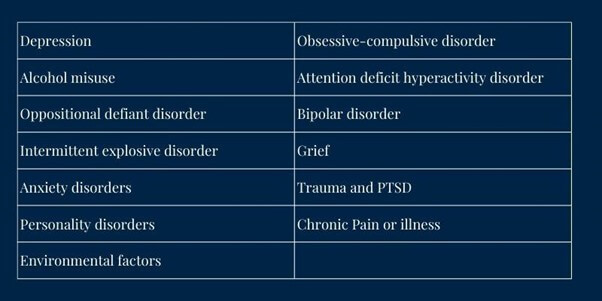
Anger issues can be caused by various underlying factors, including emotional, psychological, and environmental influences.
Some common causes of anger issues include mental health disorders, past trauma, chronic stress, and even biological factors like hormone imbalances.
People with anger problems often struggle with recognizing the triggers that set off their intense reactions. Understanding these root causes can help find the right coping mechanisms and treatment options.
Anger can also be a symptom of deeper emotional struggles, such as anxiety, depression, or feelings of inadequacy.
Many people with anger may not realize they’re masking other problems by expressing their emotions through anger.
By identifying the underlying causes, individuals can work on managing their anger in healthier ways. Let’s examine the 13 causes of anger issues.
1. Depression
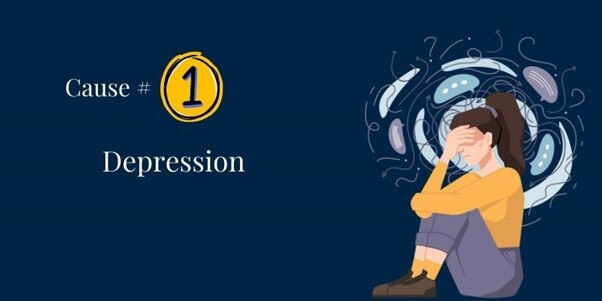
Depression is one of the most common causes of anger issues. While depression is often associated with sadness or hopelessness, it can also manifest as irritability and anger.
People dealing with depression may feel frustrated with their inability to manage their emotions, leading to frequent outbursts or resentment.
This anger often comes from helplessness, low self-worth, or frustration over their situation.
In some cases, people might lash out at those closest to them as they feel overwhelmed by their emotions and unable to express them in healthier ways.
Coping Strategies
- Seek Professional Help: A therapist or counselor can help identify the root causes of depression and anger.
- Practice Mindfulness: Mindfulness techniques, like meditation or deep breathing, can help individuals manage anger in the moment by promoting calm and self-awareness.
- Physical Activity: Regular exercise can act as a natural mood booster, releasing endorphins that help reduce feelings of anger and frustration.
- Medication: In some cases, antidepressants may be prescribed to manage both depression and associated anger issues. Always consult a healthcare professional for advice.
2. Obsessive-Compulsive Disorder (OCD)
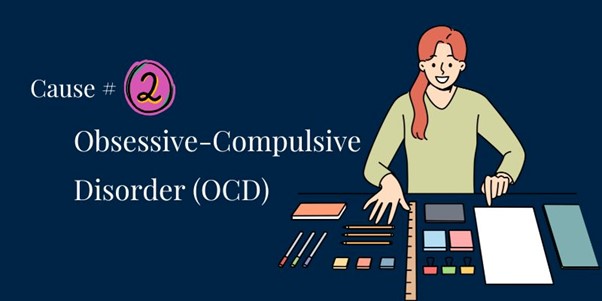
Obsessive-Compulsive Disorder (OCD) is a mental health condition that can significantly contribute to anger issues.
People with OCD experience intrusive, unwanted thoughts (obsessions) and feel compelled to perform repetitive behaviors (compulsions) to relieve their anxiety.
When these compulsions are interrupted, or things don’t go as planned, it can lead to intense frustration and anger.
For instance, someone with OCD may feel angry when their environment is not in perfect order or when they can’t perform a certain ritual.
This anger often stems from the feeling of losing control over their obsessive thoughts or compulsive actions.
The constant battle between wanting to control their surroundings and being unable to can result in frequent irritability, leading to anger outbursts.
The frustration of dealing with OCD can also lead to social isolation, further causing anger and emotional distress.
Coping Strategies
- Cognitive-Behavioral Therapy (CBT): CBT, especially Exposure and Response Prevention (ERP), helps individuals confront their obsessive thoughts without resorting to compulsive behaviors, reducing the buildup of frustration and anger.
- Mindfulness Techniques: Mindfulness helps individuals become more aware of their obsessive thoughts and emotions, allowing them to respond calmly rather than react with anger.
- Medication: Medications can be prescribed to help manage OCD symptoms and reduce associated anger issues.
3. Alcohol Misuse
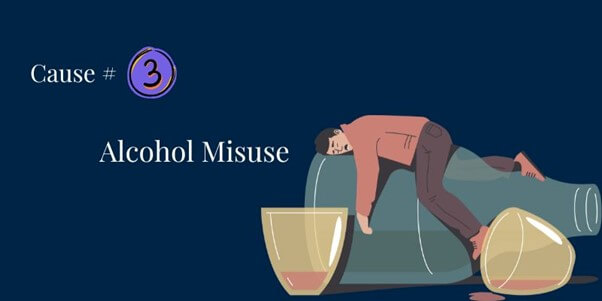
Alcohol misuse is another significant contributor to anger issues. Alcohol impairs judgment, reduces inhibitions, and can alter brain chemistry, making it harder to control emotions like anger.
People who misuse alcohol are more likely to have angry outbursts, become verbally or physically aggressive, or engage in reckless behavior.
This is because alcohol affects the brain’s ability to process and regulate emotions, lowering impulse control and increasing irritability.
Additionally, individuals who are dependent on alcohol may experience anger when they can’t drink or when they face the negative consequences of their alcohol consumption, such as strained relationships or job loss.
Over time, alcohol misuse can create a vicious cycle: drinking to cope with anger and then feeling more angry and out of control due to alcohol’s effects.
Coping Strategies
- Limit or Eliminate Alcohol Consumption: Reducing alcohol intake can significantly improve emotional regulation and reduce anger. Seek support through recovery programs like Alcoholics Anonymous (AA) if necessary.
- Therapy or Counseling: Cognitive-behavioral therapy (CBT) or group therapy can help address both the underlying issues leading to alcohol misuse and the associated anger problems.
- Lifestyle Changes: Adopting healthier coping mechanisms, such as physical activity, hobbies, or talking to friends, can provide alternatives to using alcohol as a way to handle stress and anger.
4. Attention Deficit Hyperactivity Disorder (ADHD)
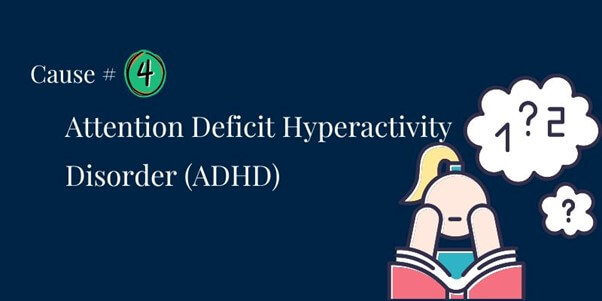
Attention Deficit Hyperactivity Disorder (ADHD) is a neurodevelopmental disorder that often causes impulsivity, restlessness, and difficulty focusing.
These symptoms can lead to anger issues, as individuals with ADHD may struggle with frustration, impatience, and emotional regulation.
For example, someone with ADHD may become easily angered when tasks feel overwhelming or when they have difficulty following through on plans.
Impulsive behavior can also lead to quick temper flare-ups, as individuals with ADHD may react emotionally before thinking through their responses.
Individuals with ADHD may feel misunderstood or judged by others, further contributing to their anger.
Over time, unmanaged ADHD symptoms can lead to strained relationships and lowered self-esteem, making it even harder to control emotions.
Coping Strategies
- Behavioral Therapy: Behavioral therapy can help individuals with ADHD develop better emotional regulation techniques, reducing impulsive anger responses.
- Medication: Stimulants and non-stimulant medications can help manage ADHD symptoms, improving focus and reducing the impulsivity that often leads to anger.
- Routine and Organization: Establishing a structured daily routine can help reduce overwhelming feelings, decreasing frustration and irritability. Using tools like planners or reminder apps can help manage ADHD symptoms.
5. Oppositional Defiant Disorder (ODD)
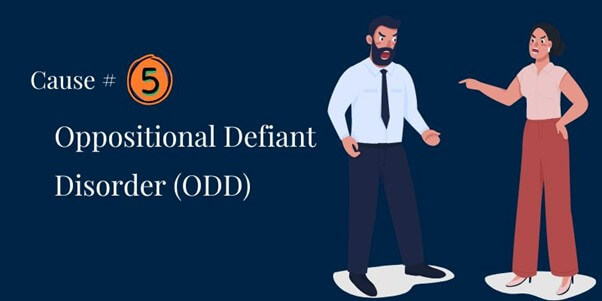
Oppositional Defiant Disorder (ODD) is a behavioral disorder that primarily affects children and adolescents, but it can also continue into adulthood.
People with ODD often display a consistent pattern of defiant, hostile, and argumentative behavior toward authority figures, including parents, teachers, or supervisors.
This defiance is usually driven by an intense desire for control, leading to frequent temper outbursts, arguments, and a refusal to comply with rules.
For individuals with ODD, everyday frustrations can quickly escalate into anger, making it difficult for them to manage their emotions effectively.
In adults, ODD can affect relationships, work, and social interactions, as their quick temper and argumentative nature make cooperation and communication challenging.
The constant friction with others leads to feelings of isolation, which can worsen their anger issues. ODD can lead to more severe mental health conditions, like anxiety or depression.
Coping Strategies
- Cognitive-behavioral therapy (CBT): It helps individuals identify negative thought patterns and learn to manage their emotions more constructively, reducing anger outbursts.
- Family Therapy: For children and adolescents with ODD, family therapy can help improve communication and reduce conflicts within the family unit.
- Positive Reinforcement: Using reward systems to encourage good behavior rather than focusing on punishment can help manage defiant tendencies and reduce anger triggers.
6. Bipolar Disorder
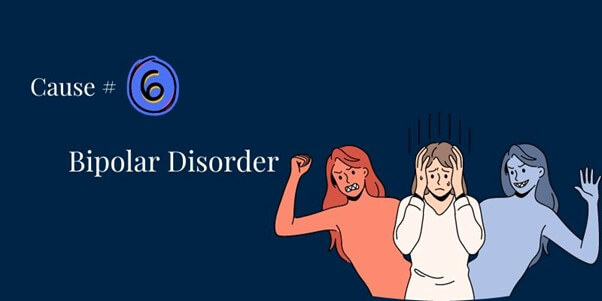
Bipolar Disorder is a mood disorder characterized by extreme mood swings that include emotional highs (mania) and lows (depression).
These mood shifts can lead to periods of intense anger and irritability, especially during manic or depressive episodes.
During manic phases, individuals with bipolar disorder may experience increased impulsivity, irritability, and frustration, leading to frequent outbursts or reckless behavior.
On the other hand, during depressive episodes, feelings of hopelessness and frustration can also lead to anger.
The difficulty in regulating emotions during these extreme mood swings makes managing anger particularly challenging for people with bipolar disorder.
They may become easily agitated, lose their temper quickly, or react disproportionately to minor issues, affecting their relationships and daily life.
When left untreated, these anger episodes can further impact mental health and lead to social isolation.
Coping Strategies
- Medication: Mood stabilizers, antipsychotics, or antidepressants are commonly prescribed to help regulate mood swings in individuals with bipolar disorder. These medications can help reduce the frequency and intensity of anger episodes.
- Cognitive-Behavioral Therapy (CBT): Therapy helps individuals identify triggers for their anger and develop coping mechanisms for dealing with their mood swings more effectively.
- Mood Tracking: Keeping a journal or using apps to track mood changes can help individuals recognize patterns in their mood swings and take proactive steps to manage their emotions before anger escalates.
7. Intermittent Explosive Disorder (IED)
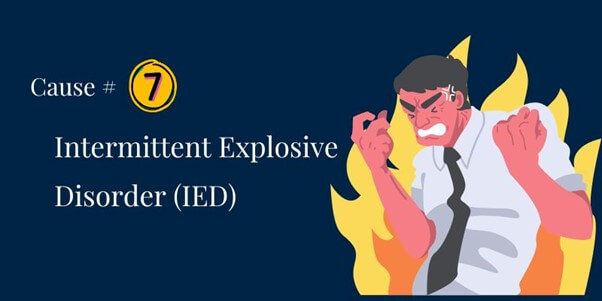
Intermittent Explosive Disorder (IED) is a mental health condition characterized by sudden, aggressive outbursts that are disproportionate to the triggering event.
People with IED often experience intense anger and rage that leads to verbal or physical aggression.
These episodes can occur without warning and usually last for a short duration, but the consequences can be severe, often leading to physical violence, property damage, or legal issues.
Individuals with IED may feel a sense of relief after the outburst, but they often experience guilt, embarrassment, or regret afterward.
IED typically develops in adolescence or early adulthood and can be triggered by various factors, including stress, trauma, or certain biological predispositions.
The frequent inability to control aggressive impulses can damage relationships, career prospects, and overall well-being.
Coping Strategies
- Cognitive-Behavioral Therapy (CBT): CBT helps individuals with IED learn how to manage anger and develop healthier ways to respond to stressful situations. It teaches coping strategies to prevent explosive outbursts.
- Medication: Antidepressants or mood stabilizers may be prescribed to help regulate emotional responses and prevent sudden anger outbursts.
- Anger Management Training: Structured anger management programs can teach individuals with IED techniques like deep breathing, relaxation, and emotional regulation to prevent impulsive reactions.
8. Grief

Grief is an emotional response to significant loss, whether it’s the death of a loved one, breakup or divorce, or another form of change.
While sadness is a common symptom of grief, many people also experience anger.
This anger can arise from a sense of helplessness, feelings of abandonment, or frustration over the inability to prevent the loss.
For instance, someone grieving the death of a loved one might be angry at medical professionals, themselves, or even the person who passed away.
The emotional unrest of grief often leads to irritability, anger outbursts, and a sense of disconnection from others.
Grief-related anger is a natural part of the healing process, but if it persists or intensifies, it can negatively impact relationships, work, and overall well-being.
It’s important to recognize that anger is a valid emotional response to loss, but it must be managed constructively to prevent long-term emotional harm.
Coping Strategies
- Allow Yourself to Feel Anger: Acknowledge your feelings rather than suppressing them. Permitting yourself to feel anger helps in processing grief more effectively.
- Seek Grief Counseling: Professional grief counseling can help you navigate the stages of grief, including anger, in a supportive environment.
- Channel Your Anger Productively: Engaging in physical activities, journaling, or participating in creative outlets can help release pent-up anger and provide a sense of relief.
9. Anxiety Disorders

Anxiety disorders, including generalized anxiety disorder (GAD), panic disorder, and social anxiety, are characterized by excessive worry, fear, and tension.
When anxiety is chronic and overwhelming, it can trigger anger as a response to the constant stress and inability to control one’s environment.
People with anxiety disorders may become irritable, frustrated, or angry when faced with situations that increase their anxiety. This anger is triggered by feeling overwhelmed, trapped, or out of control.
For example, someone with social anxiety might become angry in crowded settings where they feel judged, or someone with GAD may lash out in frustration when they can’t stop worrying.
The combination of persistent anxiety and low emotional regulation can make it challenging to manage anger effectively.
Coping Strategies
- Practice Relaxation Techniques: Deep breathing exercises, meditation, and progressive muscle relaxation can help reduce both anxiety and the anger that stems from it.
- Cognitive-Behavioral Therapy (CBT): CBT can help individuals with anxiety disorders identify thought patterns that contribute to both anxiety and anger, allowing them to reframe their responses more constructively.
- Medication: Anti-anxiety medications or antidepressants may be prescribed to help manage severe anxiety symptoms, reducing the emotional volatility that leads to anger.
10. Trauma and PTSD
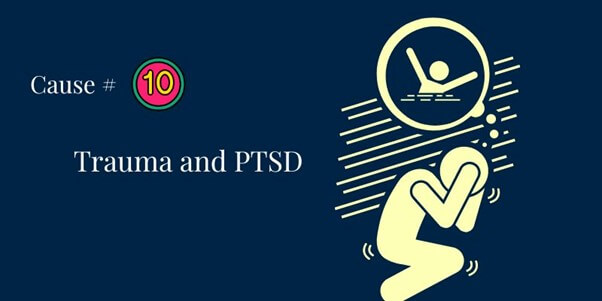
Post-Traumatic Stress Disorder (PTSD) is a mental health condition that develops after someone experiences or witnesses a traumatic event, such as violence, a natural disaster, or a serious accident.
People with PTSD often experience flashbacks, nightmares, and emotional responses, which can include intense anger.
This anger is often a result of feeling constantly on edge, as the individual may perceive threats even in non-threatening situations.
Hypervigilance and the brain’s overreaction to triggers can make it difficult for those with PTSD to regulate their emotions, leading to frequent outbursts or aggressive behavior.
Anger related to PTSD is a common response to feelings of fear, helplessness, or betrayal.
It can also be caused by the frustration of dealing with the long-lasting effects of trauma, which may include feelings of powerlessness or a loss of control over one’s life.
Coping Strategies
- Trauma-Focused Therapy: Therapies like Eye Movement Desensitization and Reprocessing (EMDR) or Cognitive Processing Therapy (CPT) help individuals process their trauma and reduce the anger associated with it.
- Grounding Techniques: Grounding exercises, such as deep breathing or using sensory objects, can help people with PTSD stay present in the moment, reducing the intensity of their anger when triggered.
- Support Groups: Joining PTSD support groups can provide a sense of community and shared experience, helping individuals feel less isolated in their struggle and offering strategies for managing anger.
11. Personality Disorders
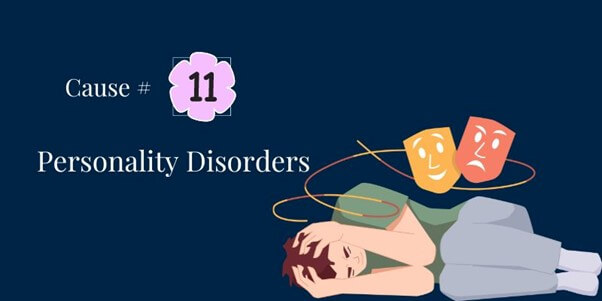
Personality disorders are mental health conditions that affect how individuals perceive themselves and relate to others.
These disorders often involve enduring patterns of behavior, cognition, and emotion that deviate from societal norms, leading to difficulties in relationships, work, and social functioning.
Borderline Personality Disorder (BPD) and Antisocial Personality Disorder (ASPD) are two examples where anger is a prominent symptom.
People with BPD may experience intense mood swings, impulsivity, and feelings of abandonment, leading to sudden anger outbursts, especially in relationships.
Those with ASPD may display aggressive and hostile behavior due to a disregard for social rules and the rights of others.
Individuals with personality disorders often struggle with managing their anger because their emotional responses are distorted.
This anger may be directed inward (leading to self-harm) or outward (causing harm to others). Without intervention, these patterns can severely impact personal and professional relationships.
Coping Strategies
- Dialectical Behavior Therapy (DBT): DBT is particularly effective for people with personality disorders, especially BPD. It teaches emotional regulation, mindfulness, and distress tolerance to help manage anger.
- Medication: Mood stabilizers or antipsychotic medications may be prescribed to help regulate extreme mood swings and reduce irritability or aggression.
- Developing Boundaries: Learning how to establish and maintain healthy boundaries in relationships can help reduce anger triggers and create more stable interactions.
12. Chronic Pain or Illness
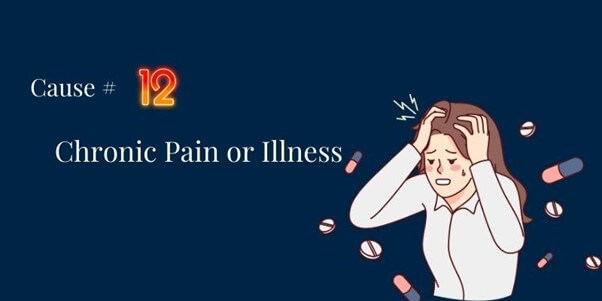
Chronic pain or long-term illness can lead to feelings of frustration, helplessness, and anger.
When someone experiences ongoing physical discomfort or limitations, their emotional state can also suffer.
The constant burden of dealing with pain can make everyday tasks seem overwhelming, leading to irritability and short tempers.
This can affect interactions with loved ones, caregivers, and colleagues. Anger in this context may also stem from loss of independence, physical ability, or quality of life.
Anger and irritability may worsen the perception of pain, creating a vicious cycle where emotional distress enhances the physical symptoms.
Coping Strategies
- Pain Management Techniques: Techniques like physical therapy, medication, or alternative treatments (e.g., acupuncture, massage) can help alleviate some physical symptoms, thereby reducing the emotional strain.
- Cognitive-behavioral therapy (CBT): It can help individuals reframe their thinking about pain and develop healthier emotional responses, reducing feelings of anger and frustration.
- Mindfulness and Relaxation: Mindfulness meditation, deep breathing exercises, or yoga can help manage emotional reactions to chronic pain, creating a more positive emotional environment.
13. Environmental Factors
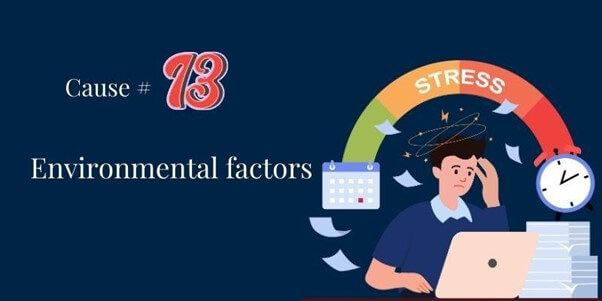
Environmental factors such as stress at work, financial instability, or living in a high-conflict household can significantly contribute to anger issues.
When people are exposed to prolonged or intense stress, they often experience increased levels of frustration and irritability, which can quickly escalate into anger.
Environmental triggers, like noise, overcrowding, or lack of privacy, can also contribute to emotional overwhelm, leading to anger outbursts.
For example, someone living in a noisy urban environment or facing ongoing financial difficulties may be more prone to anger due to their constant stress.
Additionally, growing up in a household where anger and aggression are the norm can shape how individuals respond to stress and conflict later in life.
They may struggle to regulate their emotions or express anger constructively, creating a cycle of unhealthy behavior.
Coping Strategies
- Stress Management Techniques: Learning to manage stress through mindfulness, exercise, or time management can help reduce the intensity of environmental triggers for anger.
- Improving Communication: In relationships or work environments, improving communication skills and setting clear boundaries can help reduce conflict and minimize anger-provoking situations.
- Creating a Calmer Environment: Small changes in your living or work environment, such as reducing noise or creating personal space, can help ease frustration and irritability.
What are the Symptoms of Anger Issues?
Anger issues can affect physical and emotional well-being. Recognizing these symptoms is essential for addressing the problem before it escalates into unhealthy behavior.
Understanding the symptoms can help you identify whether you or a loved one need help managing anger more effectively.
1. Physical Anger Issues Symptoms
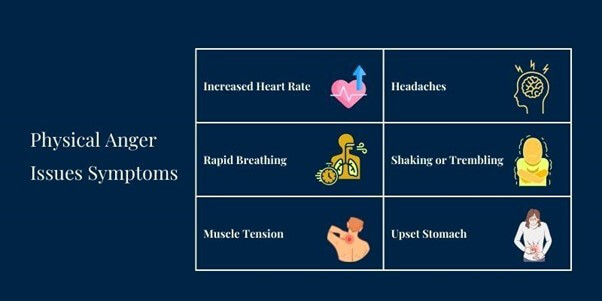
Physical symptoms of anger are the body’s way of reacting to emotional stress. These signs often arise when anger reaches a peak, causing the body to enter a “fight or flight” mode.
- Increased Heart Rate: When anger spikes, your heart rate rises, preparing your body for a fight-or-flight response.
- Rapid Breathing: Anger can cause quick, shallow breaths as your body tries to take in more oxygen.
- Muscle Tension: Tightening muscles, particularly in the neck, shoulders, and jaw, is common when anger builds up.
- Headaches: Tension headaches often accompany anger due to the physical strain and increased blood pressure.
- Shaking or Trembling: Intense anger can cause your hands or body to shake due to adrenaline surging through your system.
- Upset Stomach: Anger may lead to digestive issues like nausea, stomachaches, or indigestion.
2. Emotional Anger Issues Symptoms
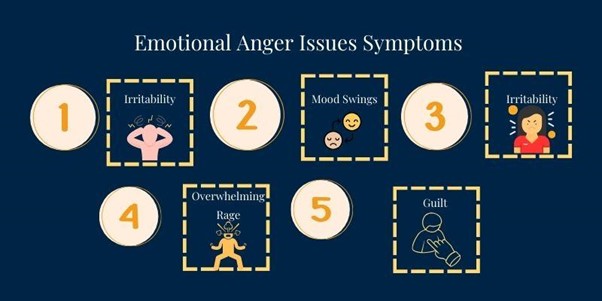
Emotional symptoms of anger make it difficult to focus on anything else, and small inconveniences can trigger an exaggerated response. Individuals might also feel overwhelmed or powerless, which can deepen feelings of anger.
- Irritability: Frequent anger can easily frustrate you by small, everyday issues.
- Mood Swings: Emotional instability often accompanies anger, causing sudden shifts from calm to enraged.
- Resentment: Holding onto past frustrations can build up resentment, fueling ongoing anger toward people or situations.
- Overwhelming Rage: Extreme anger may lead to a loss of emotional control, causing violent outbursts or destructive behavior.
- Guilt or Regret: After an angry outburst, you may feel ashamed or regretful, leading to a cycle of self-blame and further emotional turmoil.
What Are the Types of Anger Issues?
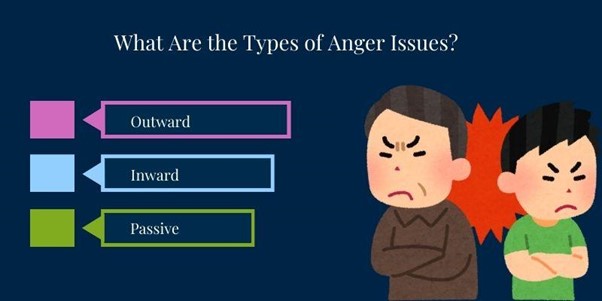
Recognizing the type of anger issue is the first step toward managing it effectively. There are generally three categories of anger issues: outward, inward, and passive.
Each type has its own characteristics and effects on personal relationships and mental health.
Understanding these types can help develop strategies to address anger more constructively, reducing its negative impact on your life.
1. Outward
Outward anger is the most recognizable type of anger issue. It’s characterized by the external expression of anger, often through yelling, verbal abuse, or physical aggression.
People who experience outward anger typically react explosively to situations that frustrate them, leading to arguments, shouting matches, or even physical altercations.
This type of anger is usually aimed at other people or objects, and it can be emotionally and physically destructive.
Those who struggle with outward anger may find it difficult to control their outbursts and may say or do things they later regret.
Over time, this behavior can severely damage relationships and even lead to legal or professional consequences if the anger escalates to violence.
Managing outward anger often involves learning healthy ways to express frustration, such as through assertive communication or practicing calming techniques.
2. Inward
Inward anger, on the other hand, involves directing anger toward oneself rather than outwardly at others.
People with inward anger may suppress their feelings, internalizing their frustration and resentment.
This self-directed anger often leads to negative self-talk, guilt, shame, or even self-harming behaviors like excessive criticism or neglecting personal needs.
Inward anger is less visible to others but can be incredibly damaging to one’s mental health, leading to issues like depression or anxiety.
Inward anger often arises from feelings of powerlessness or the inability to express emotions in a healthy way.
People with this type of anger might struggle with low self-esteem or perfectionism, feeling angry at themselves for not meeting their own or others’ expectations.
Managing inward anger often requires developing self-compassion and learning to express emotions.
3. Passive
Passive anger is less direct but can be equally damaging. It involves expressing anger indirectly through passive-aggressive behavior, sarcasm, or intentional procrastination.
People with passive anger may avoid confrontations but still harbor resentment, which can show up subtly, like giving “silent treatment” or sabotaging a situation in small ways.
Unlike outward anger, passive anger is often masked by a calm or indifferent exterior, making it harder to recognize.
This type of anger can be toxic in relationships because it creates an undercurrent of hostility and conflicts without directly addressing the issues. It can confuse or frustrate the other person, as the anger isn’t openly communicated.
Managing passive anger requires improving communication skills and addressing conflicts directly instead of avoiding or undermining them.
Coping Up Strategies of Anger Issues Management
Coping with anger can become easier if you can identify the cause. Here are some effective strategies that are commonly used to manage anger issues.
- Opt for Anger Management Classes: Learn structured techniques to manage and control anger.
- Relaxation Techniques: Practice deep breathing or meditation to calm down during anger.
- Anger Management Exercises: Engage in physical activities like walking to release built-up tension.
- Support Groups: Connect with others facing similar anger challenges for emotional support.
- Behavioral Therapy: Address negative behaviors and develop healthier responses to anger.
- Cognitive Restructuring: Change negative thought patterns that fuel anger into positive ones.
- Better Communication: Learn how to express feelings clearly and assertively without aggression.
- Using Humor: Defuse tense situations by finding humor to reduce anger.
- Think Before Speaking: Take a moment to collect your thoughts before reacting angrily.
- Express Your Anger in a Constructive Way: Share your frustrations calmly to resolve conflicts.
- Identify Potential Solutions: Focus on problem-solving instead of dwelling on what made you angry.
- Let Go of Grudges: Forgive to reduce resentment and free yourself from ongoing anger.
- Medications: Consult a doctor about medications that can help manage severe anger issues.
Anger Issues Frequently Asked Questions
What are the 5 keys to controlling anger?
The five keys to controlling anger are
- Recognizing triggers
- Practicing relaxation techniques
- Assertive communication
- Taking timeouts
- Seeking professional help
What mental disorder is anger?
Anger can be a symptom of various mental health disorders, including Intermittent Explosive Disorder, Borderline Personality Disorder, and Bipolar Disorder.
What are anger issues a symptom of?
Anger issues can be a symptom of underlying problems such as depression, anxiety, PTSD, trauma, or personality disorders.
What emotion is behind anger?
Anger often masks underlying emotions such as fear, sadness, frustration, or helplessness.
How do you control anger immediately?
To control anger immediately, take deep breaths, count to ten, or physically remove yourself from the situation to prevent impulsive reactions.
Conclusion
Anger is a natural emotion, but it can lead to significant problems in personal relationships, professional life, and overall well-being when it becomes uncontrollable or frequent.
Understanding the root causes of anger, whether they stem from mental health disorders, stress, or environmental factors, is crucial for effectively managing it.
Identifying triggers, learning coping strategies such as mindfulness, deep breathing, or seeking professional help can significantly reduce the negative impact of anger on your life.
Addressing the issue sooner rather than later is important for those who find themselves frequently overwhelmed by anger to prevent long-term emotional and relational damage.
Therapy, anger management courses, and supportive environments can be transformative in managing anger and improving emotional regulation.
By understanding the underlying emotions that often fuel anger, such as fear or frustration, and practicing techniques to stay calm, it’s possible to lead a more balanced and peaceful life.
Anger is often a symptom of deeper emotions or unresolved issues, and by dealing with those in a healthy way, you can regain control over your emotional responses.
Addressing anger issues allows for better emotional health, improved relationships, and a higher quality of life.


3 Responses